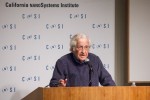The father of modern linguistics delivered the first of several public lectures at UCLA on Monday as part of a weeklong lecture series.
Noam Chomsky, a professor emeritus at the Massachusetts Institute of Technology, is giving a series of open lectures on linguistic theory at UCLA from Monday through Thursday.
The event was hosted by UCLA’s Department of Linguistics. Roughly 250 people attended the first lecture Monday, said Claudia Salguero, linguistics department manager. Attendees included UCLA undergraduate and graduate students, USC students and visitors from overseas who flew in to attend the lecture, she said.
Chomsky spoke about the history of linguistics during Monday’s lecture, as well as several linguistic theories he developed. One of these theories was the theory of universal grammar. Chomsky proposed there are universal linguistic rules that are innately hard-wired in humans. These basic rules apply to all languages on earth.
One piece of evidence Chomsky presented for his theory of universal grammar is that children are able to learn the basic grammar of a language despite being exposed to limited and sometimes ungrammatical speech. This would only make sense if humans are predisposed to learn language.
“Acquisition of language should be based on some kind of capacity to pick out what’s significant and important from quite an impoverished data,” Chomsky said.
This innate, biologically driven linguistic system must be rich enough to account for the variability of all human languages, and simple enough to evolve, he added.
“The faculty of language must have been very simple,” Chomsky said, “Galileo urged that we accept the idea that nature is simple as the task of the scientists to show it.”
In addition, this innate linguistic system is found only in humans, Chomsky said.
“It’s unique to humans. There’s nothing analogous in the organic world,” Chomsky said. “It’s the foundation of human culture, human creativity.”
He added there is little evidence of communication systems similar to human language prior to the appearance of modern humans.
Chomsky emphasized the value of studying languages. Most people take their language capabilities for granted, but it’s fascinating how humans can create an infinite combination of expressions by using just 25 to 30 sounds, Chomsky said.
“(Language) permits us to express all our secrets,” he said, “It affects everything we see, the most diverse movements of our soul. And if you stop to be willing to be puzzled, it’s a pretty amazing fact.”
Many students attended the lecture because they have heard of Chomsky in their classes or on their own.
Tina Huang, a fourth-year bioengineering and linguistics and computer science student, said she attended the lecture because she has read Chomsky’s theories in class.
“I have studied many of Chomsky’s proposals and theories and I’m very fascinated by his philosophy,” she said.
Some student attendees said they were daunted by the technical depth of the lecture.
Jessica Tomlin, a fourth-year political science student, said she found the lecture confusing for students who did not have a linguistics background.
“As the lecture progressed, it got more and more technical and nonaccessible for people who didn’t have a very good understanding of linguistics coming in,” She said, “I definitely wouldn’t go to the next lecture since I think it’s only going to get more technical from here.”
Emily Melik Aslanian, a fourth-year applied linguistics student, said she was excited to attend the lecture because Chomsky is a prominent figure in the linguistics field.
“I honestly thought I’d never see him in person, so it’s crazy that he’s here right before I’m graduating,” she said. “I don’t think I would miss that.”

A very special opportunity!